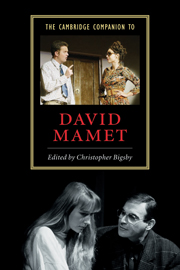Book contents
6 - The 1990s
Published online by Cambridge University Press: 28 May 2006
Summary
David Mamet's theatrical ventures throughout the 1990s reveal some surprising shifts in tone, theme, and dramatic form. Experimenting with various literary genres and historical venues, he defies stereotypes that confine him to the aggressively masculine world of such previous plays as American Buffalo and Glengarry Glen Ross. The impressive number of essays, novels, screenplays, and films that Mamet has produced and directed since 1990 might, at first, suggest a movement away from writing expressly for the stage. It is during these years, however, that he crafts some of his most enigmatic and politically engaging plays to date. These were years of transition for Mamet as a playwright: he continued to revise such earlier tropes as the confidence man, precarious states of language and power, the art of teaching, homecomings and goings, and the picaresque. Yet throughout the 1990s and into this century, Mamet expanded his scope to include such controversial topics as sexual harassment, child abuse, lesbian estrangement, and ethnic identity. In his most recent plays, he is more willing than ever to provoke and unsettle, refusing to provide the comforting closure of transparent morals and simple resolutions.
- Type
- Chapter
- Information
- The Cambridge Companion to David Mamet , pp. 103 - 123Publisher: Cambridge University PressPrint publication year: 2004
- 1
- Cited by

